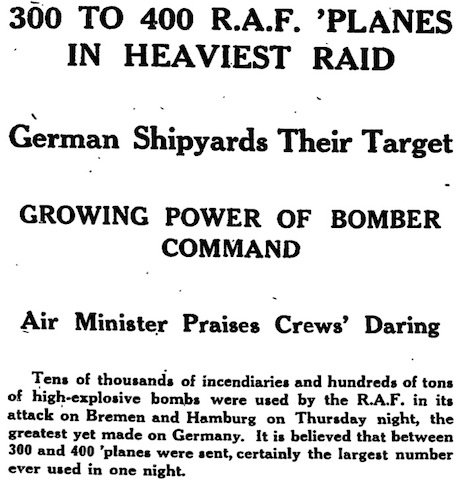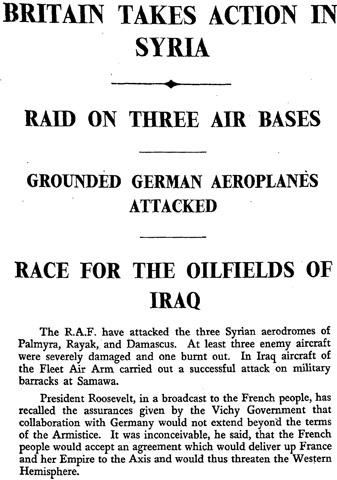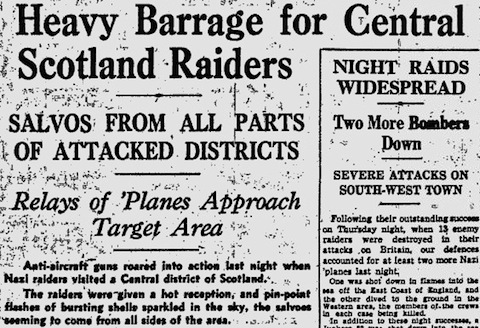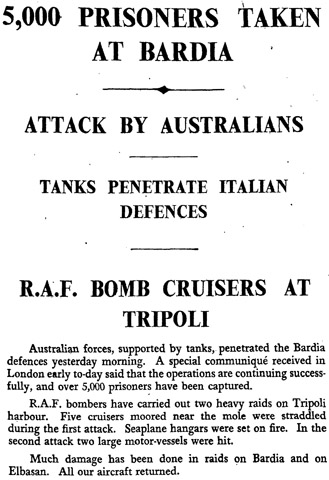
Ten aircraft failed to return from Bomber Command’s operations over Germany on Thursday night. Those losses are quite small in relation to the number of British aircraft involved in the raids on Hamburg and Bremen, between three and four hundred, ‘certainly the largest number ever used in one night’ according to page 7 of the Manchester Guardian.
Moon and weather favoured the attack, and the submarine and shipbuilding yards of both ports were heavily damaged. Pilots’ individual reports speak of areas a mass of flames, in which it was impossible to distinguish separate fires, and of great explosions caused by our most powerful bombs being dropped into the heart of the fires.
The report in The Times (4) is more vivid and evocative, which seems to have inspired even the subeditor (‘cities seared by fire’).
In other industrial quarters of both towns there were widespread fires as well, and many other marks of devastation. At Hamburg a whole wharf was blazing as a single stick of bombs was seen to split open a row of buildings. Here smoke was rising to 10,000ft., and in another part of the town smoke rolled in black eddies and suggested the destruction of great stores of oil.
Of course, German raids on Britain continue as well. The official report states (2) that:
The scale of the enemy attack on Thursday night was again heavy. The principal concentrations were on the Humber area and two districts in the north Midlands. In the Humber area considerable damage was done and preliminary reports indicate that casualties are likely to be heavy. In one area in the north Midlands there was substantial damage, but casualties are not expected to be very numerous.
The Humber raid was the second in successive nights. Accordingly an evacuation of schoolchildren was organised; ‘the air raid welfare committee has brought the scheme of compulsory billeting into operation to deal with homeless people’. The casualties included three firemen killed by a bomb near their station, and three firewatchers killed in an air raid shelter. One side-effect of the raids is that ‘Some of the many girls made workless by the destruction of shops were yesterday enlisting in the women’s services’.
Are people getting fed up with the way the war is going? Judging from the (time-honoured but notoriously treacherous) evidence of a recent by-election, the answer would seem to be no. The Guardian reports (8) on the result of Thursday’s poll in King’s Norton (Birmingham). Previously comfortably held by a Conservative, under the wartime party truce it was contested this time by none of the other major parties. However, two independents with diametrically opposed platforms threw their hats into the ring. One was Stuart Morris, national secretary of the Peace Pledge Union; the other Dr A. W. Lumsden Smith, who ‘was known as the “Bomb Berlin” candidate. He advocated reprisals for the indiscriminate Nazi raids on this country’. The result was a majority of 19,877 for Captain Peto of the Conservatives, with Lumsden Smith getting 1696 votes and Morris 1552. Both independents therefore lost their deposits. This would seem to be a good result for the government, but the Guardian makes little of it and it’s not even mentioned in The Times.
A leading article in the latter attempts to draw conclusions from ‘the large correspondence which continues to reach The Times about civil defence against air raids’ (5). It finds that three major questions are at issue. Firstly, ‘how can the outpost line — the large number of citizens organized as watchers and fire-bomb fighters in business and residential areas — be strengthened’? The training and equipment of these groups is left to local authorities, and is haphazard at best (for example, they aren’t even issues with steel helmets). If the local authorities can’t do the job properly, ‘then some other authority must be created to do the work’. Secondly, ‘how can the main line of defence — the fire brigades and the A.F.S. [Auxiliary Fire Service] — be improved’? Again, it’s a matter of ‘the unit of the local authority’ being ‘too small and too imperfectly organized’ to assemble an adequate fire-fighting force when a heavy air raid takes place. This should be done on a regional basis, as ‘there is abundant evidence that many local authorities have been too complacent, too unimaginative, and sometimes actually secretive about their plans’. Thirdly, and this again relates to the problem of purely local organisation, is the question of whether post-raid services (rest centres, advice bureaus, reserves of clothing) are being adequately prepared in advance, or are just being improvised on the spot.
The operations of all these bodies — official and unofficial — cannot be left to the chance of whether the Emergency Committee of the local authority happens to be complacent or energetic, obscurantist or forthcoming, prejudiced or imaginative. Unless all have worked out their plans in collaboration beforehand there will be many more casualties, much more damage, much slower recuperation, human and material — in short, there will be chaos on the night and for a long time afterwards.
The Times suggests that the answer is that the government, through its regional commissioners, ‘insist’ that these plans are drawn up and coordinated by and between local authorities before raids, not during and after them. It might have mentioned, though it did not, an upcoming parliamentary motion for a Ministry of Civil Defence, ‘charged to coordinate the activities of all local government authorities and other agencies concerned’. This was tabled by three Labour MPs, Dr Haden Guest, Ben Smith and Kenneth Lindsay (National Labour, actually), as reported on page 2.
Overseas, things seem to be relatively quiet: Italy has reported that ‘Benghazi had been bombarded from the sea and the air’ (Manchester Guardian, 7); after the revolt of elements of the Iraqi army, British forces have occupied parts of Basra and have cleared the plateau overlooking the RAF aerodrome at Habbaniyah; the Italian defence of Abyssinia is nearing its end.
The most intriguing news comes from the Soviet Union. After recently taking for himself the job of prime minister from Molotov, Stalin has now decided to withdraw formal recognition of the legations from Belgium, Norway and Yugoslavia; that is to say, the Soviet Union no longer recognises them as independent states and, in the words of the Manchester Guardian‘s diplomatic correspondent (7), ‘disapproves the fight of their independent Governments to liberate their native lands from the German invaders’. This is described as ‘appeasement’ of Germany, perhaps in the hopes of preventing ‘further German demands’. A more analytical piece by historian Sir Bernard Pares, a Russian specialist, thinks that despite all this, Russia’s real interests are manifestly the same as our own’ (6). He describes Russia as preparing for war with Germany:
Active defence preparations are going on all along the Russo-German frontier, and on both sides of that front increasing numbers of troops are being concentrated […] the strongest concentration of Soviet forces is in the Ukraine, which has now for the first time been almost wholly united to Russia. Meanwhile significant preparations are being made for a German invasion of the Ukraine.
Of the recent non-aggression pact with Japan, Sir Bernard thinks it clears the way for ‘the long-awaited Japanese drive to the southern seas’; for the Soviet Union, it serves to ‘immobilise any threat in the East in order to concentrate her attention westward’. Given the presence of German divisions in Finland, the German thrust into the Balkans, and its current destabilisation of Iraq, ‘it is high time for her to do so’.
Mr. Reginald Foort, the organist, was given five minutes of the B.B.C.’s broadcasting time last night to deny that he was a Fifth Columnist. He began his “special message,” as the announcer called it, by referring to rumours that he was in prison or locked up in the Tower of London or in an internment camp. As an answer to these rumours he pointed out that since the first months of the war he has been giving daily performances on his organ at theatres and halls.
He suggested two possible reasons: one that is having ‘a double “o” in your name makes in a bit foreign’; alternatively it might have something to do with ‘the destruction of the B.B.C. theatre organ’.
![]() This work is licensed under a Creative Commons Attribution-NonCommercial-NoDerivatives 4.0 International License.
Permissions beyond the scope of this license may be available at http://airminded.org/copyright/.
This work is licensed under a Creative Commons Attribution-NonCommercial-NoDerivatives 4.0 International License.
Permissions beyond the scope of this license may be available at http://airminded.org/copyright/.




Organist, eh?
Pingback: Airminded · Sunday, 11 May 1941
Not sure what’s so funny, Erik. Organs are very important in churches; priests insist that they are played with regularly.